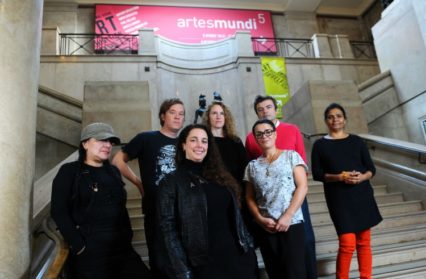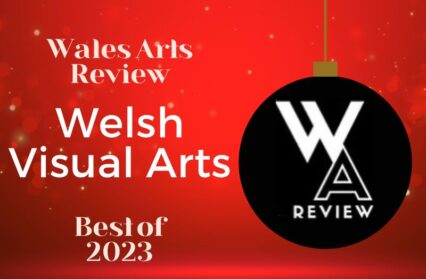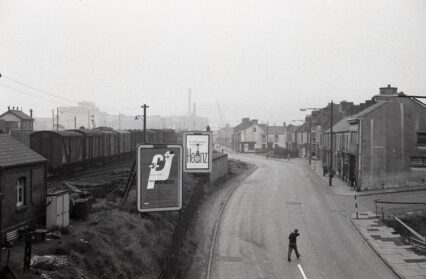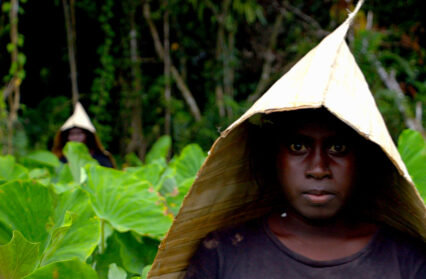Joao Morais is in Porter’s Bar in Cardiff reviewing a production by fringe theatre country Dirty Protest which draws inspiration from the Artes Mundi prize.
It’s amazing how a new bar at the arse end of town can be so full on a school night, but such is the power of Dirty Protest. This fringe theatre company has a deservedly strong following due to its reputation for creative set-ups (they’ve put on shows in hair salons and kebab shops before) and their commitment to providing the same opportunity to emerging writers as they do to more established names. Their latest show puts an ‘arty twist’ on proceedings, challenging seven writers, both green and seasoned, to draw their inspiration from this year’s Artes Mundi prize.
The venue for this show, a relatively new establishment called Porter’s Bar, is billed as an ‘arts and artist’s bar.’ What this means in essence is that it looks exactly as you would expect – bare yet painted walls, a concrete floor, and a corner stage housing an unused drum kit. While it may have the look and feel of Cardiff Met’s Tommy’s Bar (that being only a stone’s throw away) and likely meant to appeal to the same clientele, it is unfortunately without the same subsidised student bar prices.
The auditorium towards the side of Porter’s Bar was the setting for Dirty Protest’s night of mini-plays. One of the most captivating parts of this idea was trying to work out which play had been interpreted by which artwork – though this was made all the more difficult as some of the Artes Mundi finalists themselves had submitted work that veered on the side of the abstract. The writers were free to interpret their designated artist as they saw fit, and it was interesting to see how they approached the visual and turned it into the active. It was this type of creativity that made Dirty Protest’s theatrical twist more fun than the Artes Mundi itself.
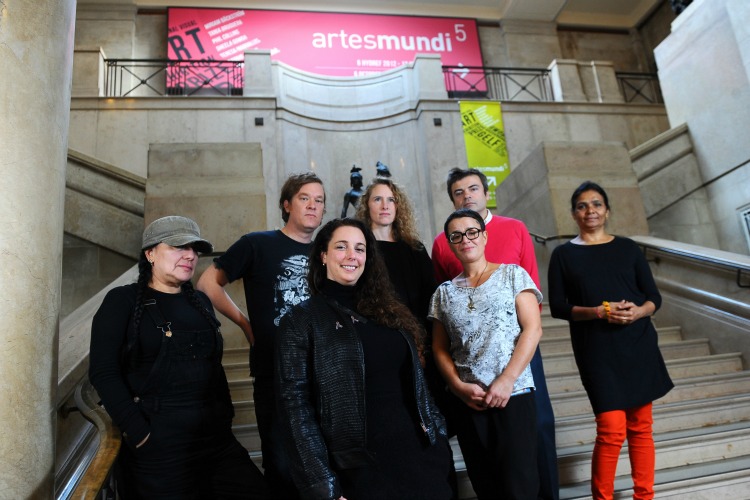
Eft to right: Tania Bruguera, Miriam Backstrom,
Darius Miksys, Apolonija Sustersic and Sheela Gowda
(photo from yourcardiff.walesonline.co.uk)
One that interpreted along the more creative lines was Tom Wentworth’s play, based on Sheela Gowda’s Kagebangara. The installation itself consists of oil drums and tarpaulin to represent the daily struggle for survival that India’s low-caste road labourers endure every day. As these raw materials are used in place of a salary, Wentworth had concentrated on the hoarding element in Gowda’s work. Much like the rest of the junk in his main character’s house, an oil drum was superfluous to the requirements of day-to-day living – and worked instead as a symbol of the character’s grief since the death of his wife. If the whole purpose of Gowda’s work is to highlight the social and economic constraints of India’s poor by showing the minimal shelter and materialistic possessions of the unskilled workers who live and work on the side of India’s great roads, then Wentworth thoughtfully turns this on its head, by concentrating on the process of grieving in a materialist manner through storing and buying more than any one person could ever possibly need.
Lotty Talbut was another writer who opted to turn things around. Opening up the series of short plays, ‘Suddenly Silence’ was the most transparent piece and a good one to start with – The animated and sharp Siôn Ifan started things off, along with the consistently humorous Daniel Llewellyn-Williams, in a twisty plot-based play. After receiving a severed hand in the post, two old friends are forced to reveal what they know to each other about the situation, resulting in a calamitous future to their friendship. Talbut wisely chose not to sensationalise death in her play, as Teresa Margolles does in her prize-winning work.
However, having not been given long to prepare, the actors held their lines in front of them – after all, three weeks to write and practice seven plays is not a long time – and it did take until perhaps the third play in the series for their papers to become ‘invisible’ (that is, for the viewer to become used to the actors reading from scripts). Being the first, Talbut’s play did suffer a little from the audience’s point of view – but the actors still carried it off well. It did however almost result in a calamitous start when Llewellyn-Williams looked at the wrong page, resulting in a pause of a few extra seconds, which was almost enough to break through the suspension of disbelief.
My highlight of the night though had to go to Heledd Wyn’s monologue, ‘Too Cool for School,’ inspired by Apolonjina Šušteršič‘s documentary on Cardiff Bay, Politics In Space/ Tiger Bay Project. Wyn can write a good story and Daniel Llewellyn-Williams was the perfect choice to recite it in an engaging and highly amusing manner. His character, Alwyn, tells the story of his pre-pubescent rivalry with Scouse Joe at Barry Island, and his subsequent friendship with Fat Pat, the new and unpopular kid at school. Llewellyn-Williams balanced comedy and tragedy in this small comedic joy, animating the piece with a succinct understanding of gallows humour. The story itself could take anyone back to a time and place where it really seemed to matter what trainers you wore and who you were hanging out with.
A different approach to portraying identity and belonging was taken by Andy Evans. His play ‘WE ARE CHIMERA’ was based on Tania Bruguera’s performance art. The two principal characters find themselves in a holding pen in the dystopian near-future for each being 1/4 or 1/8th English respectively. The two actors for this part, Hannah Daniel and Sara Lloyd-Gregory, are both Welsh speakers – a fact that was not lost on the audience, considering their profiles on S4C.
But this Third CymReich version of nation, language and nationalism seemed to miss the point. It seems that whenever independence is mentioned in Wales, nationalism and culturalism cannot be distinguished. Bruguera’s motto for her Immigrant Respect Campaign – Dignity Has No Nationality – seemed to be taken at face value in order to castigate the Welsh language under the facade of humour.
If anything, Evans’s piece showed two things about Dirty Protest’s idea to set works inspired by the Artes Mundi: it showed the impressive dexterity of the actors, in jumping between believable roles in each play, and the difficulty of finding out which artist inspired which writer. Originally I thought it was Darius Miksys who inspired Evans, the Lithuanian who selected objects from the Welsh national collection in order to make a narcissistic ‘oblique portrait‘ of himself as his entry in the Artes Mundi – only to find out afterwards that it was in fact inspired by the performance artist Bruguera, whose anti-establishment work aims to fuse social groups together.
And it was this element of surprise, like the many entertaining plays put on by Dirty Protest for this show, that made it a night worth remembering. If only Porter’s Bar could replicate the bar tariff of its arty student cousin Tommy on the other side of HMP Cardiff then there would have been no real cause for complaint, such was the success of this show – praise indeed when it comes to fusing the Artes Mundi’s dry visual art with an engaging night of theatre.
Joao Morais is an author who has written numerous articles for Wales Arts Review as well as original pieces of Flash Fiction.


